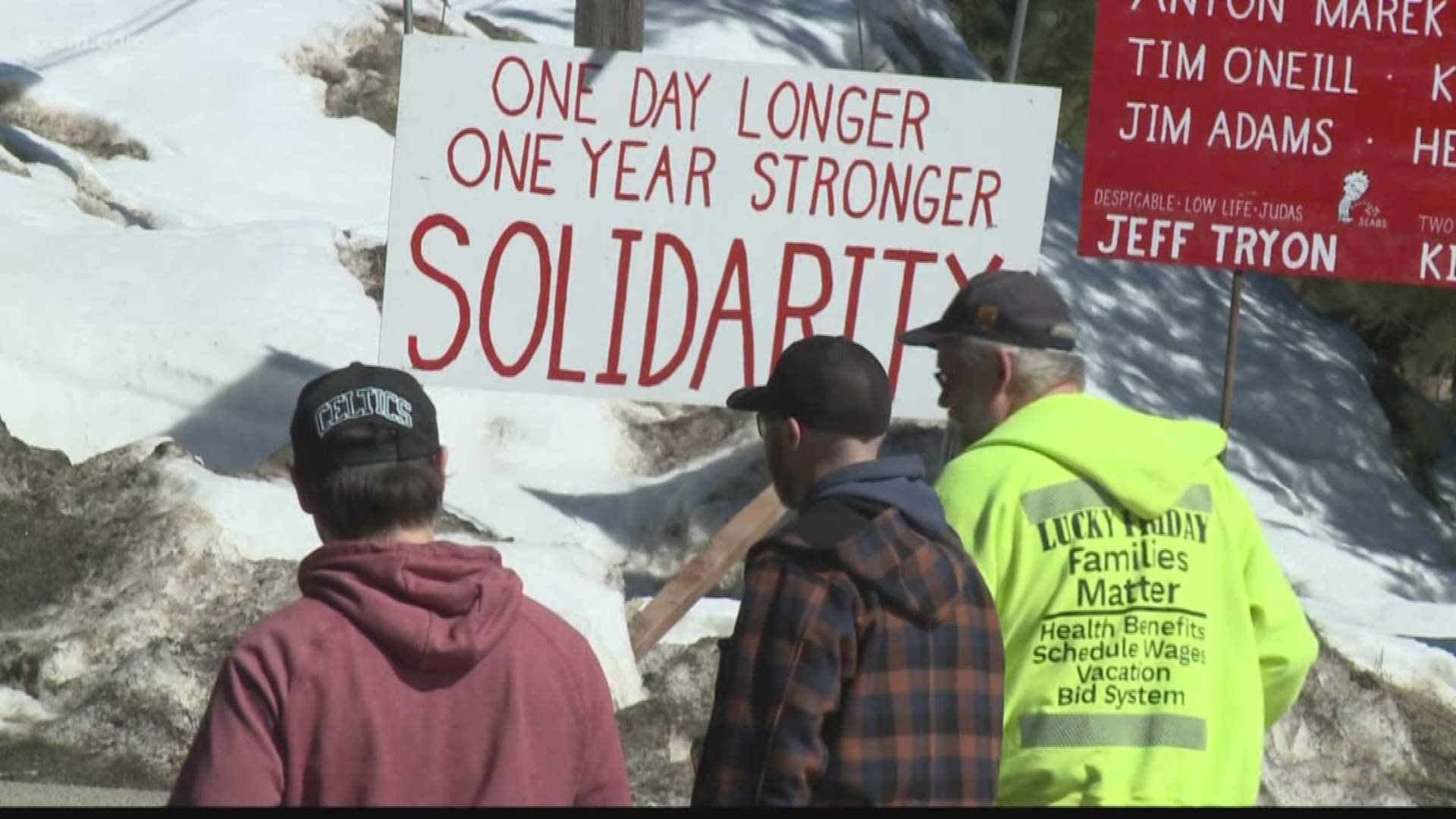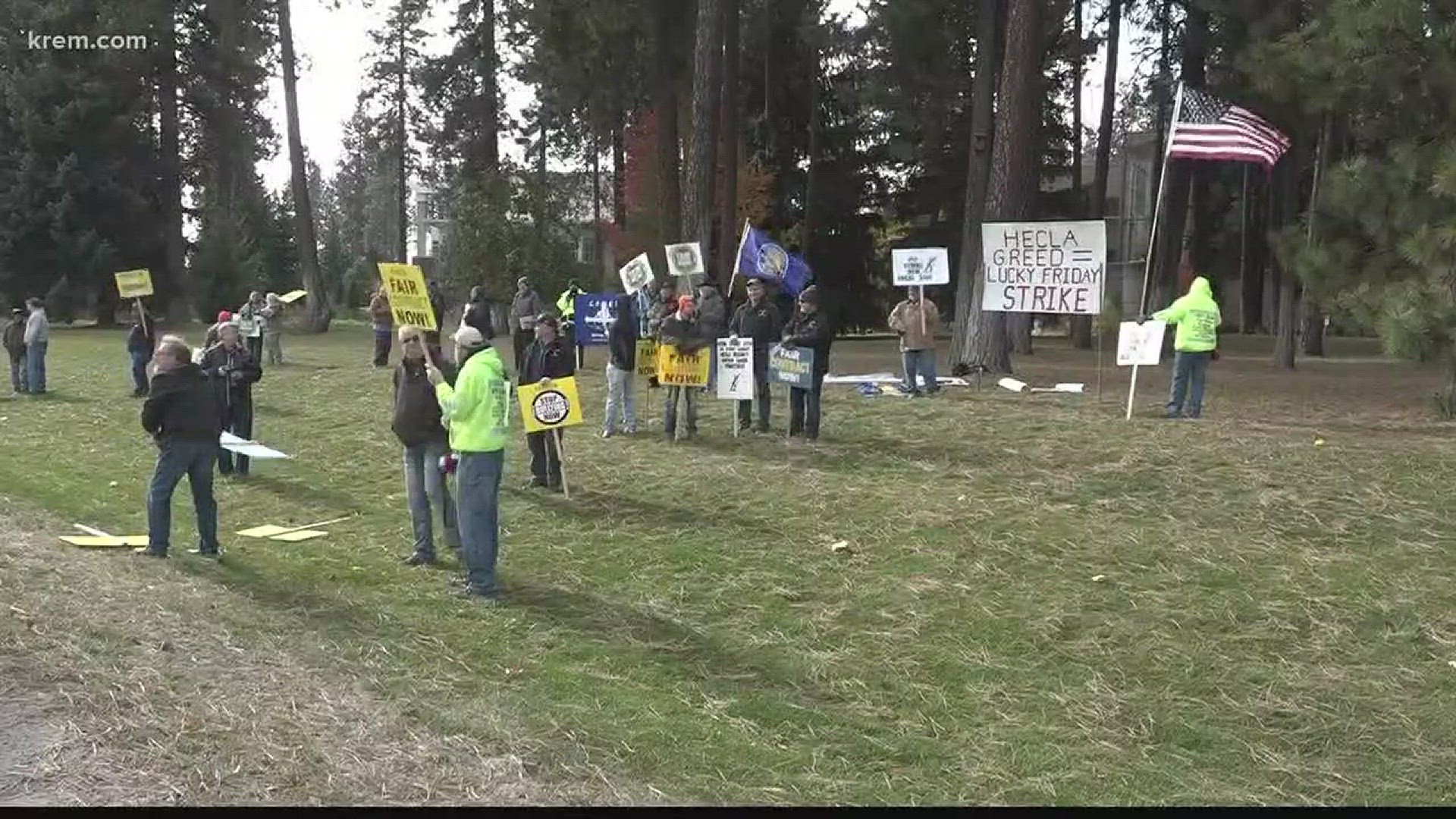It's now been two years since miners at the Lucky Friday silver mine in Mullan, Idaho voted to go on strike. Miners say both sides remain mostly dug in during what's become the longest miner strike in the history of the Silver Valley.
Striking miners remain visible just outside Lucky Friday, taking shifts at a makeshift picket camp.
"Like any strike, they're not easy," said miner Rick Norman. "It's the resilience that's pretty amazing, really."
Dan Daiker, an underground mine mechanic, said he's been forced to find side jobs repairing four-wheelers and snowmobiles in order to pay his bills.
"We make ends meet. We sacrifice some stuff," he said. "It's tough. I'm fighting in what I believe in."
Since the strike began, most of the 250 miners in the local United Steelworkers union have since found other part-time jobs for supplement income, said local union president Dave Roose. That includes some miners who now work at mines in other states like Montana and Alaska and travel back to Shoshone County to see their families during their days off.
The impasse was sparked by contract negotiations between the local union and Hecla Mining – which operates Lucky Friday – two years ago. At the time, the union took issue with various proposals from Hecla, including work schedules and other factors.
A particular aspect that's remained a sticking point between both sides is a team bidding system traditionally used to determine work teams and assignments at Lucky Friday. Roose said the system allows more senior and experienced miners to act as leaders and make sure mining jobs are carried out safely.
Hecla has called the bidding system outdated and unnecessary.
"Hecla wants a fair contract, but the Union is insistent on retaining an outdated Team Bidding system that is not in place at any other mine in the United States (including other nearby mines which are represented by the [United Steelworkers])," wrote Hecla spokesman Luke Russell in an email to KREM. "The bidding system is not a safety factor."
Russell emphasized, as Hecla has for the last two years, that the changes are necessary in order to keep Lucky Friday profitable.
"The ability to put the right people in the right place at the right time (like all other mines have the right to do) is logical way to attempt to bring down the costs," Russell wrote.
"Hecla has offered a compensation package that is higher than the compensation package in the expired contract. The strike is not about economics," he added.
The company's proposals have been continually decried by the miners and the union.
"We're talking about the life of our union, here. That's what [Hecla] wants. They want our seniority rights. They want our job bidding," Norman said.
Roose noted that keeping aspects of seniority among Lucky Friday miners, along with safety, was important to the union.
“We wish Hecla would come back to the table,” he said.
Roose told KREM that the union's stance on the bidding system may change but the union wanted Hecla to continue to recognize seniority at Lucky Friday. On Tuesday, local union leadership was set to meet to put together a proposed work agreement that would be presented to Hecla at a later date.
Roose said that both sides last met in November, while Russell said that negotiations hadn't taken place since the summer of 2018.
In the meantime, Roose called United Steelworkers' international chapter instrumental in helping local members get by on a day-to-day basis. USW has continued to send weekly funds to the local union, which are then disbursed to union members on a case-by-case basis, primarily in the forms of gas and grocery gift cards. The funds have also helped supply a food bank for members at the union hall in Mullan.
A thankful Roose called the assistance "immense."
As for Hecla, Russell had previously said that salaried staff working at Lucky Friday weren't focused on ore production during the strike and were instead preparing the mine for new technology.
Striking miners at the picket line admitted rising tensions between union members and newly hired miners who had crossed picket lines.
"If you're hired on after we go on strike, you're a scab," Norman said. "Two years in, I got my finger on the pulse of this pretty good. And I can feel the tensions rising."
Norman emphasized that the local union has tried to take the "high road" when it came to interactions with mine employees who continue to work.
Norman, along with Roose and Daiker, recognized the toll that the two-year long strike has had on Silver Valley families.
"Yeah there's problems, but we just tough it out. And these families get stronger because of it," Norman said.
"I want to go back to work. I enjoyed it up here. I was planning on retiring up here," Daiker said.
While Lucky Friday's reputation has lately been one associated with a work stoppage, Norman said he and other miners are always reminded of fatal mining accidents that have occurred there over the years.
"If we don't have a voice, [Hecla] can do anything they want at the workplace."


